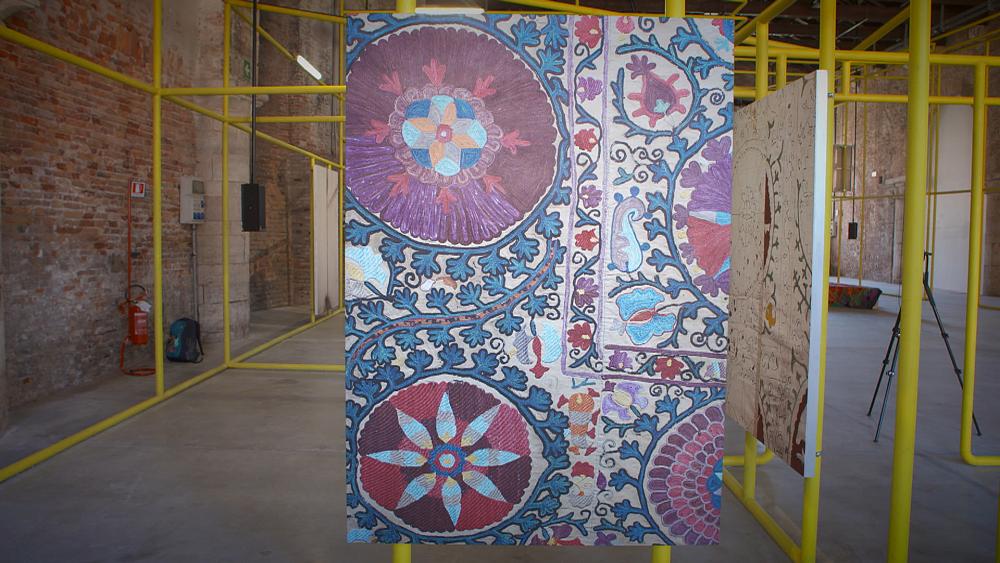How do we live together in the future? 46 countries – including Uzbekistan for the first time – dealt with this question in the 17th edition of Architecture Biennale in Venice.
The 17th edition of the International Exhibition of Architecture began in the wonderful atmosphere of the Venice Biennale. For the first time, Uzbekistan is represented by its own pavilion.
Uzbekistan wants to use the opportunity to present itself as a country that is open to innovation and cultural development, ready to solve problems and discuss them internationally. They want to highlight their rich intellectual and cultural potential, their heritage and the history of the country. Uzbekistan wants to attract a new audience and make international contacts – both academically and culturally.
Uzbekistan from an unknown angle
The Central Asian country hosts the Mahalla exhibition. It opened May 20 on the Arsenale website. The highest cultural bodies held a press conference:
“Our gallery is dedicated to the Mahalla, a unique architectural and social phenomenon. It is a traditional form of community life, a form of neighborhood and a form of local administration.”Saida Mirziyoeva, Deputy Chairman of the Board of Trustees of the Foundation for Art and Cultural Development of the Ministry of Culture of the Republic of Uzbekistan. “Mahalla is our story. At the same time, it is an important aspect of today’s urban reality.”
She also said: “We present our locality, and with it you can understand Uzbekistan”Says Aziz Abdul Hakimov, Deputy Prime Minister and Minister of Tourism and Sports. Chairman of the Organizing Committee of the National Pavilion of Uzbekistan. “Because it is a unique phenomenon among our population: it is a way of life, a way of life, a form of behavior of the Uzbek people. The Mahalla phenomenon can serve as a model for Europe. And as an example of how people of different religions, languages, cultures as well as different nationalities live together in peace and quiet and support each other We hope that Mahalla will become a new cultural brand of Uzbekistan in the world.”
The multidisciplinary project brings the model of the archetypal Uzbek region, Mahalla, to Venice. It is not just an apartment building, but a form of communal life, organized by rituals and traditions.
Life and architecture only work together
The pavilion shows a typical Uzbek house with a courtyard. The app with the name of the gallery allows you to take a virtual trip.
Mahalla teaches us that life and architecture only work together.says architect Christoph Jantenbein. “Architecture in itself is nothing and life needs a built environment, it needs protection, it needs a frame. These patio homes are great examples of that. This wonderful architecture has a lot to do with the traditional form of living.”
The reduction to a metal structure is completed by twelve photographs by Bas Prinsen. The background music comes from Carlos Casas. It is meant to bring the sound of everyday life in the Mahalla area to Venice. Mahalla is Uzbekistan’s answer to the question or slogan of this year’s Biennale of Architecture: How will we live together in the future?
The project has a strong educational and academic approach. Created in collaboration with local consultants and students from the architectural duo Christ and Jantenbein Designer.
“It was very important for us to get the students involved so they can think outside the box”Jayan Omirova, Executive Director of the Foundation for Artistic and Cultural Development of the Ministry of Culture of the Republic of Uzbekistan says; Exhibition project representative. “The focus was on collaboration, a kind of energy exchange. Maybe in the future they can design projects together. They can learn from each other.”
Many of the neighborhood has no future. The reasons for this are economic pressure, changing lifestyles, and a lack of necessary infrastructure. This project also aims to document the testimonies of the Uzbek community before they disappear. Roberto Secoto, President of the Venice Biennale:
“It is a very systematic approach: learning from the past in order to shape the present and the future. The project is beautiful: this type of architecture is a vision that tells about living together, from a neighborhood perspective and from a societal perspective. It is a project that perfectly meets the spirit of the times and the intentions of the Biennale.”
The main curator of this year’s Architecture Biennale is Eng. Hashem Sarkis. 46 countries participate. It runs until November 21, 2021.

“Certified gamer. Problem solver. Internet enthusiast. Twitter scholar. Infuriatingly humble alcohol geek. Tv guru.”





